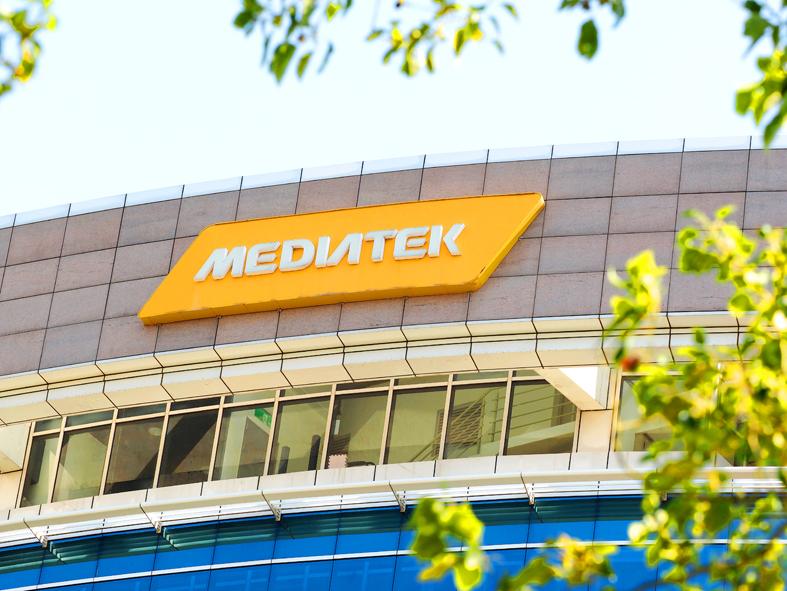Chip designer MediaTek Inc (聯發科) has formed a strategic partnership with Intel Corp to manufacture chips using the US company’s matured process technology as the Taiwanese firm aims to build more resilient and balanced foundry sources, the companies said yesterday.
The agreement will help MediaTek add a new foundry partner with significant capacity in the US and Europe, according to the joint statement said.
“Building on the existing 5G data card venture with Intel, MediaTek is extending the partnership into Intel Foundry Service (IFS) to mature Intel 16 node to support our fast-growing smart edge devices,” MediaTek said in a joint statement.

Photo: David Chang, EPA-EFE
MediaTek said it is to adopt Intel's Intel 16 process node, which is comparable to Taiwan Semiconductor Manufacturing Co's (TSMC, 台積電) 22-nanomter process node, to produce chips used in TVs, routers and other smart-home devices.
“In addition to maintaining a close partnership with TSMC in advanced process nodes, this collaboration [with Intel] will enhance MediaTek’s supply for mature process nodes,” the company said. “We believe this collaboration will help our further market expansion in global smart edge devices”
MediaTek is one of the early adopters of TSMC’s most advanced process technologies such as 4-nanometer and 7-nanometer technologies to build their smartphone chips.
MediaTek is “our long-term customer and we have a strong partnership in advanced technology collaboration. There is no impact on TSMC’s business with MediaTek,” TSMC said of MediaTek’s deal with Intel.
MediaTek has long adopted a multi-sourcing strategy, N.S. Tsai (蔡能賢), corporate senior vice president of the firm’s platform technology and manufacturing operations, said in the statement.
The company already partners with Intel on the 5G data card business, and aims to deepen their collaboration to smart edge devices through IFS, Tsai said.
Intel established IFS last year to help meet rising demand for advanced semiconductor manufacturing capacity. The company recently announced factory expansions at existing sites, as well as plans for major investments in new sites in Ohio and Germany.
“We have the right combination of advanced process technology and geographically diverse capacity to help MediaTek deliver the next billion connected devices across a range of applications,” IFS president Randhir Thakur said in the joint statement.

SEMICONDUCTORS: The German laser and plasma generator company will expand its local services as its specialized offerings support Taiwan’s semiconductor industries Trumpf SE + Co KG, a global leader in supplying laser technology and plasma generators used in chip production, is expanding its investments in Taiwan in an effort to deeply integrate into the global semiconductor supply chain in the pursuit of growth. The company, headquartered in Ditzingen, Germany, has invested significantly in a newly inaugurated regional technical center for plasma generators in Taoyuan, its latest expansion in Taiwan after being engaged in various industries for more than 25 years. The center, the first of its kind Trumpf built outside Germany, aims to serve customers from Taiwan, Japan, Southeast Asia and South Korea,

Gasoline and diesel prices at domestic fuel stations are to fall NT$0.2 per liter this week, down for a second consecutive week, CPC Corp, Taiwan (台灣中油) and Formosa Petrochemical Corp (台塑石化) announced yesterday. Effective today, gasoline prices at CPC and Formosa stations are to drop to NT$26.4, NT$27.9 and NT$29.9 per liter for 92, 95 and 98-octane unleaded gasoline respectively, the companies said in separate statements. The price of premium diesel is to fall to NT$24.8 per liter at CPC stations and NT$24.6 at Formosa pumps, they said. The price adjustments came even as international crude oil prices rose last week, as traders

SIZE MATTERS: TSMC started phasing out 8-inch wafer production last year, while Samsung is more aggressively retiring 8-inch capacity, TrendForce said Chipmakers are expected to raise prices of 8-inch wafers by up to 20 percent this year on concern over supply constraints as major contract chipmakers Taiwan Semiconductor Manufacturing Co (TSMC, 台積電) and Samsung Electronics Co gradually retire less advanced wafer capacity, TrendForce Corp (集邦科技) said yesterday. It is the first significant across-the-board price hike since a global semiconductor correction in 2023, the Taipei-based market researcher said in a report. Global 8-inch wafer capacity slid 0.3 percent year-on-year last year, although 8-inch wafer prices still hovered at relatively stable levels throughout the year, TrendForce said. The downward trend is expected to continue this year,

Taiwan Semiconductor Manufacturing Co (TSMC, 台積電), which supplies advanced chips to Nvidia Corp and Apple Inc, yesterday reported NT$1.046 trillion (US$33.1 billion) in revenue for last quarter, driven by constantly strong demand for artificial intelligence (AI) chips, falling in the upper end of its forecast. Based on TSMC’s financial guidance, revenue would expand about 22 percent sequentially to the range from US$32.2 billion to US$33.4 billion during the final quarter of 2024, it told investors in October last year. Last year in total, revenue jumped 31.61 percent to NT$3.81 trillion, compared with NT$2.89 trillion generated in the year before, according to